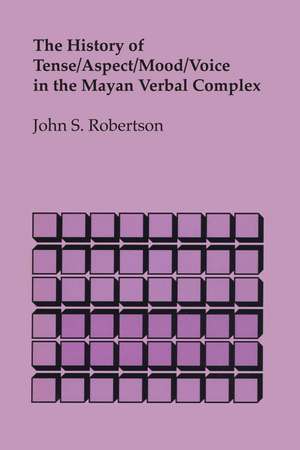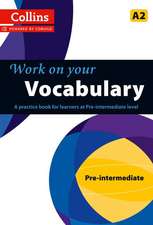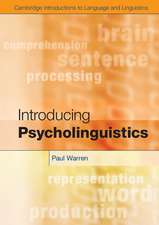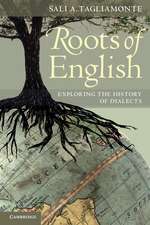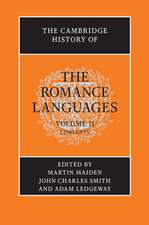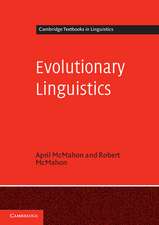The History of Tense/Aspect/Mood/Voice in the Mayan Verbal Complex
Autor John S. Robertsonen Limba Engleză Paperback – aug 2014
Building on groundwork already laid in phonological studies and in the study of the pronominal system, Robertson's examination of tense/ aspect/ mood/voice is the next logical step in the general linguistic study of Mayan. Robertson offers careful consideration of all the major subgroups of Mayan, from Yucatecan to Quichean, as they are spoken today. He also draws extensively on colonial documents assembled by bilingual Spanish-Mayan speaking clerics. These documents provide a check on the accuracy of both the reconstructed ancient language, Common Mayan, and the theoretical evolution of the modern languages from this ancestor. The study will also be of value to students of the Maya glyphs, since it discusses the grammatical system that most probably underlies the glyphic representations.
Beyond its obvious interest for Mayan linguistics, the study proposes a theory of language change that will be important for all students of comparative linguistics. Robertson's work sets forth the basic, universal assumptions that provide for an appropriate description of the grammatical systems of all languages. It will be a significant reference for future researchers.
Preț: 201.02 lei
Nou
Puncte Express: 302
Preț estimativ în valută:
38.46€ • 40.16$ • 31.83£
38.46€ • 40.16$ • 31.83£
Carte tipărită la comandă
Livrare economică 04-18 aprilie
Preluare comenzi: 021 569.72.76
Specificații
ISBN-13: 9780292769588
ISBN-10: 029276958X
Pagini: 264
Dimensiuni: 152 x 229 x 15 mm
Greutate: 0.39 kg
Editura: University of Texas Press
Colecția University of Texas Press
ISBN-10: 029276958X
Pagini: 264
Dimensiuni: 152 x 229 x 15 mm
Greutate: 0.39 kg
Editura: University of Texas Press
Colecția University of Texas Press
Notă biografică
John S. Robertson is Professor Emeritus of Linguistics at Brigham Young University and author of numerous studies of the Mayan languages.
Cuprins
- Abbreviations
- Preface
- Chapter 1. Introduction
- The Comparative Historical Method and the Mayan Languages
- Chapter 2. Deductive Principles of Language Change
- The Peircian Notion of Sign
- The Organization of Linguistic Signs into Grammatical Systems
- Systems of Oppositions
- Opposition and Classification
- A Definition of Index, Icon, and Symbol
- Conformative, Reciprocal, and Constructive in Grammatical Systems
- Principles of Diachronic Change
- Influence
- Markedness Reversal
- The Hierarchical Status of Syntagmatic Combination and Paradigmatic Cumulation
- Introductive Change
- Displacement
- Summary
- Chapter 3. The System of TAMV in the Common Language
- Predicates and Arguments
- Voice and Transitivity
- Arguments of Predicates and Prepositions
- Aspectual vs. Nonaspectual Predication
- ERGATIVE and ABSOLUTIVE Pronouns
- Split Ergativity
- INHERENT vs. REDUCTIVE VOICE
- OBJECT INCORPORATION
- Substantival Transitivity
- Substantival “Voice”
- The Reconstruction of the Markers for Single and Double Arguments
- The Four Major Prefixal Categories
- COMPLETIVE/INCOMPLETIVE
- The Relationship between COMPLETIVE Aspect and PAST Tense
- OPTATIVE
- FUTURE
- TAMV in the Context of More than One Predication
- The Category ABS-VOICE
- The Category NOM-VOICE
- The Category ABS-MOOD
- The Category NOM-MOOD
- The Relationship between NOM-VOICE and NOM-MOOD
- Another Kind of Nominalization
- The Relationship between NOM-VOICE (Progressive) and the INCOMPLETIVE
- The Influence of NOM-MOOD on the FUTURE
- Chapter 4. Mamean
- Mam
- COMPLETIVE
- Influence of the PROGRESSIVE on the INCOMPLETIVE
- Summary of Mam
- Awakatek
- The INCOMPLETIVE
- Dependent and Independent Clauses in the PROXIMATE PAST
- Influence of the INCOMPLETIVE by NOM-VOICE
- Displacement of FUTURE by OPTATIVE
- The Directional Verbs: ABS-MOOD and NOM-MOOD
- Summary of Awakatek
- Ixil
- INCOMPLETIVE, COMPLETIVE, OPTATIVE, and FUTURE
- Directional Verbs
- Conclusion
- Chapter 5. K'iche'an
- K'iche'
- Colonial K'iche': INCOMPLETIVE, OPTATIVE, and COMPLETIVE
- Colonial K'iche' FUTURE
- Modern K'iche'
- COMPLETIVE, INCOMPLETIVE, OPTATIVE, and FUTURE
- The Directional Verbs
- Summary of Colonial K'iche'
- Colonial Kaqchikel
- COMPLETIVE, INCOMPLETIVE, OPTATIVE, and FUTURE
- Summary of Kaqchikel
- Tz'utujil
- COMPLETIVE, INCOMPLETIVE, OPTATIVE, and FUTURE
- Summary of Tz'utujil
- Poqom
- COMPLETIVE
- FUTURE
- Another INCOMPLETIVE
- Modern Poqomchi'
- Summary of Poqom
- Q'eqchi'
- INCOMPLETIVE and COMPLETIVE
- OPTATIVE and FUTURE
- From Colonial to Modern Q'eqchi'
- COMPLETIVE, INCOMPLETIVE, OPTATIVE, and FUTURE
- Summary of Q'eqchi'
- Chapter 6. Q'anjob'alan
- Q'anjob'al
- COMPLETIVE and PROXIMATE PAST
- INCOMPLETIVE
- OPTATIVE and FUTURE
- The Directional Verbs
- Summary of Q'anjob'al
- Jakaltek
- COMPLETIVE and PROXIMATE PAST
- FUTURE
- Summary of Jakaltek
- Chuj
- COMPLETIVE and PROXIMATE PAST
- INCOMPLETIVE
- OPTATIVE
- FUTURE
- Summary of Chuj
- Chapter 7. Choltí and Chorti'
- Choltí
- PROGRESSIVE, INCOMPLETIVE, and FUTURE
- From Choltí to Chorti'
- Loss of INCOMPLETIVE/COMPLETIVE/FUTURE
- The Negative in Common Mayan, Choltí, and Chorti'
- The Fate of the Common Mayan Suffixes *-ik, *-O, *-oq, and -A?
- Summary of Choltí/Chorti'
- Chapter 8. Tzeltalan
- Pre-Tzeltalan COMPLETIVE and PROXIMATE PAST
- Pronominal Affixation
- The INCOMPLETIVE in Tzeltalan
- The FUTURE and the OPTATIVE in Tzeltalan
- From the Colonial to the Modern Tzeltalan Languages
- From Colonial to Modern Tzeltal
- COMPLETIVE/INCOMPLETIVE with TRANSITIVE/INTRANSITIVE
- The Tzeltalan INCOMPLETIVE
- Summary of Tzeltalan
- Tojolab'al
- Chapter 9. Yukatek Maya
- Colonial Yukatekan
- Voice: Replacement of NOMINATIVE VOICE by RELATIVE VOICE
- Replacement of the INCOMPLETIVE by the NOMINATIVE VOICE
- Colonial Yukatek Maya FUTURE
- The COMPLETIVE in Colonial Yukatek Maya
- From Colonial to Modern Yukatek Maya
- Summary of Yukatek Maya
- Chapter 10. Huastec
- Summary of Huastec
- Chapter 11. Summary
- Chaining
- Bibliography
- Index
Descriere
In this pathfinding study of the Mayan language family, John S. Robertson explores major changes that have occurred in the core of Mayan grammar from the earliest, reconstructed ancestral language down through the colonial languages to the modern language
